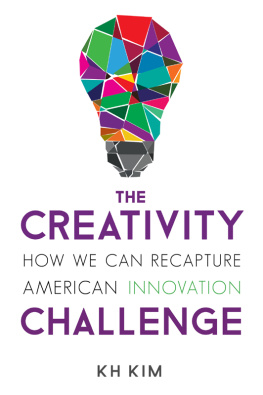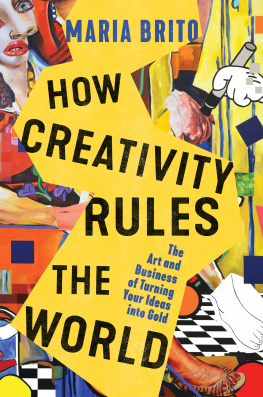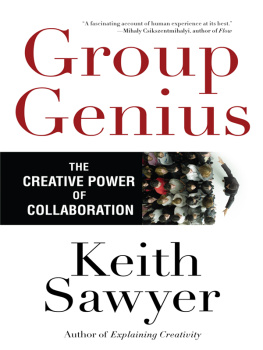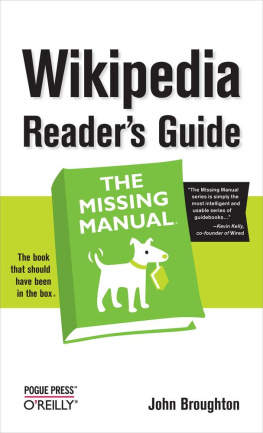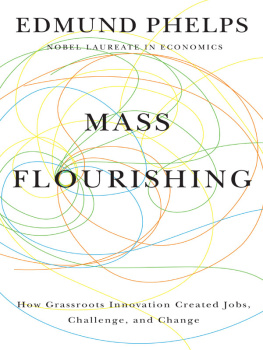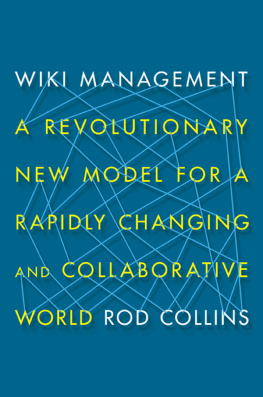WE-THINK
We-Think is a riveting guide to a new world in which a whole series of core assumptions are being overturned by innovations on the web. Leadbeater draws a series of remarkable conclusions Matthew DAncona, Spectator
An important book, even for sceptics like me. We-Think is inspiring in its analysis, I urge you to read it Andrew Keen, Independent
I was gripped. The books theme is as big and as bold as it gets should be compulsory reading for all who seek to understand the driving force of this century Management Today
Helps readers to frame some of the important questions for the coming decade Director
CHARLES LEADBEATER is one of the worlds leading authorities on innovation and creativity in organisations. He worked for the Financial Times for ten years and was ranked by Accenture as one of the top management thinkers in the world. The New York Times described his idea of the Pro Am revolution as one of the most influential of the decade.
WE-THINK
Charles Leadbeater
(and 257 other people)
Illustrations by
Debbie Powell

First published in Great Britain in 2008 by
PROFILE BOOKS LTD
3A Exmouth House
Pine Street
Exmouth Market
London EC1R 0JH
www.profilebooks.com
This eBook edition published in 2010
Copyright Charles Leadbeater, 2008, 2009, 2010
The moral right of the author has been asserted.
Typeset by MacGuru Ltd
info@macguru.org.uk
This eBook is copyright material and must not be copied, reproduced, transferred, distributed, leased, licensed or publicly performed or used in any way except as specifically permitted in writing by the publishers, as allowed under the terms and conditions under which it was purchased or as strictly permitted by applicable copyright law. Any unauthorised distribution or use of this text may be a direct infringement of the authors and publishers rights and those responsible may be liable in law accordingly.
A CIP catalogue record for this book is available from the British Library.
eISBN 978 1 84765 389 5
For Harry and Ned
CONTENTS
PREFACE
I have tried, imperfectly, to write We-Think in the spirit of the argument, openly and collaboratively. The book draws on the ideas of many other people, who are noted in the acknowledgements. But about half-way through the writing it dawned on me that it would be odd to write about the growth of collaborative creativity in the traditional way: the writer at his desk, isolated from the world, alone with his thoughts. With the support of my publisher, Profile, I posted an early draft on my website so people could download it, print it, read it and comment on it. They could also go to a wiki version to change the text and distribute it to their friends and colleagues. And so I just let it go, bouncing along the links that make up the web like a skimming stone.
At first sight this is a very odd thing for a writer to do, on at least two counts. First, as several people pointed out, if I gave away the draft for free, would people want to buy the finished book? My hunch, confirmed by other experiments of this kind, is that sales will not suffer. The more the draft is downloaded, the more talked-about it will be and the more likely people are to buy the final work all the more so as it includes Debbie Powells great illustrations. The version you are reading today differs markedly from the first draft put on the web. Secondly, why wash my dirty linen in public? Showing a draft to anyone induces in me a deep insecurity and anxiety. There are bound to be errors, omissions, mistakes. That is why normally I show a draft only to my wife. Why on earth make it available to lots of people I do not know?
Since I put that early draft online in October 2006, the material has been downloaded on average 35 times a day; about 150 comments have been posted on the site about the text; it has been mentioned on more than 250 blogs; I have received about 200 emails from people wanting to point me in the direction of useful information; and by late 2007 a Google search for the book title and my name came back with 65,600 hits.
Did this little experiment in collaborative creativity work? Well, no one was horrible. There was neither vandalism nor abuse. Some of my early callers were pretty sceptical. The first post on the site, from an ardent Irish blogger, basically said, Who the hell do you think you are? Ive been blogging for years what do you know about it? One respondent said the idea was codswallop and another that it was stale. Some people wondered whether it was just a clever wheeze to get other people to write a book for me and so to make money out of their voluntary contributions. Later, another respondent suggested I put a Donate here button on the text to make sure I got paid: he warned me that lots of fake books were circulating on the Internet and suggested that if I were not careful someone would run away with my ideas.
Everyone was very forgiving of my poor spelling and grammar. Many people suggested improvements in how it could be published online, to make it easier for people to engage with. The system I had designed to enable people to make comments on the text proved far too cumbersome. Lilly Evans suggested that the book should be designed for the iPod generation so the contents could be shuffled about. Dave Pawson pointed me to some open-source software that would allow people to annotate the text. Lots of people directed me to material, links and examples they thought would amplify the argument, including Matt Hanson, who alerted me to his open-source film-making project, A Swarm of Angels, which involves hundreds of people; and Sandra from Vancouver, who told me about user-generated comic characters on mobile phones. Others let me know that they were taking up the ideas even before the book was finished. Michiel Schwarz and some friends in the Netherlands started a think-tank called The Beach in honour of some of the ideas that were in Chapter 1 when the draft appeared on the web and when I met them they introduced me to the idea that you are what you share which I then took as the title for the opening chapter. A television producer from Samsung in South Korea emailed to say he had been reading the text and wanted to interview me for the companys internal television channel. Paul Mark said he was trying to promote participative approaches to rural development in India. Virtually everyone was very supportive, which, of course, is very encouraging.
A number of people took the time to make really detailed comments, which were often challenging and improved the book no end. Miranda Mowbray wrote me a long and very helpful email on a Saturday morning from Bristol which among other things pushed me to think about the resurgence of folk culture. Nigel Eccles, a management consultant, posted a useful 10-point critique which tempered my overenthusiasm. Jeremy Silver corrected what I had said about his company Sibelius. Tim Sullivan wrote from New York to alert me to Scott Pages work on diversity and creativity which influenced my thinking a great deal. The most persistent, however, was Heiko Spallek, whom I never either met or talked to. Heiko is an assistant professor of dentistry at the University of Pittsburgh and he read every last word, pointed out many errors and omissions, alerted me to interesting stuff he had seen and then at the end came up with his own conclusions for the book, which are available online with the text.
Next page


